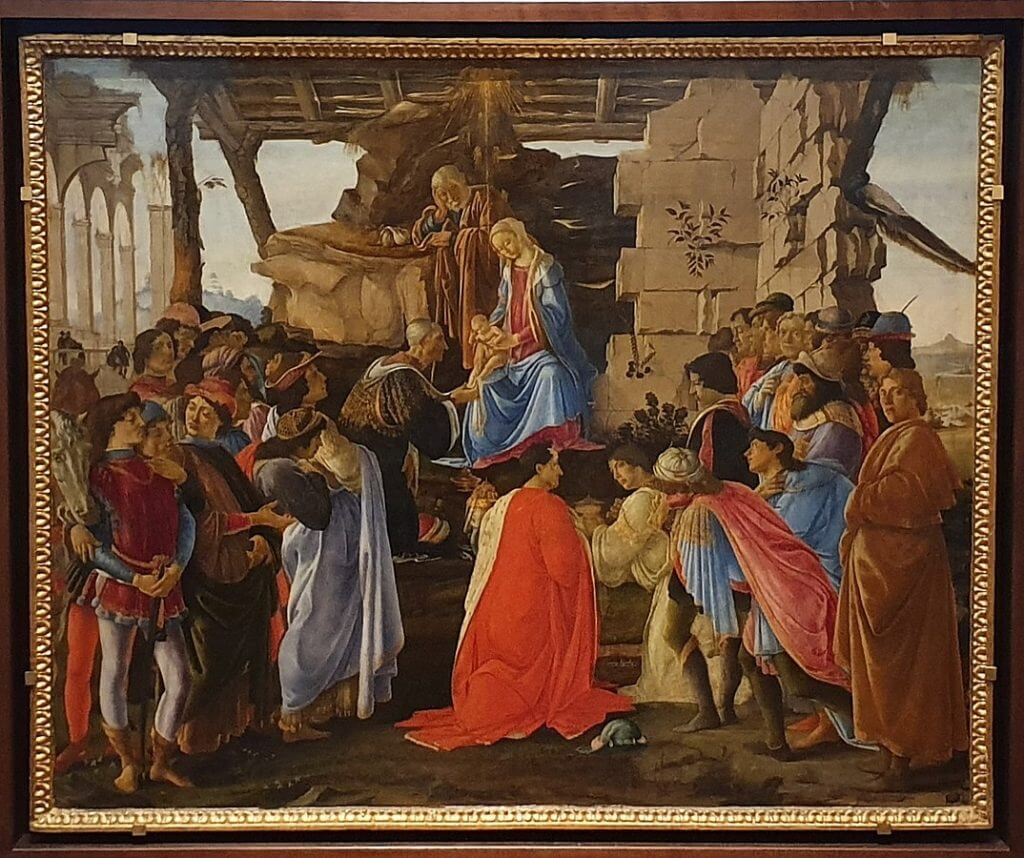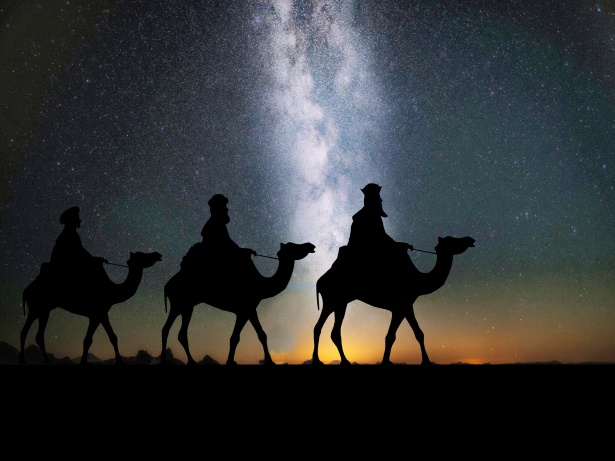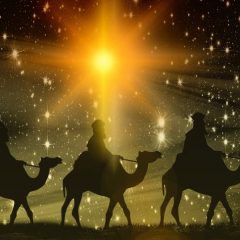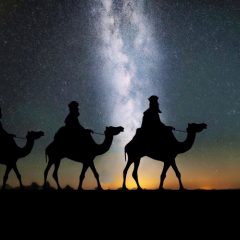epiphany
Trust The Star

The Epiphany Of The Lord
Fr. Peter Robinson
Preached: January 6, 2023
Trust the star, to bring you to the SON
* Matthew 2:1-12 / The Epiphany of the Lord
In the first year that I lived in Austria (in Europe) in the mid 1990s, I quickly noticed something I could not explain. Often, over the doors in my apartment building I would see some sort of code written in white chalk. The code was a mix of letters and digits. For example, I would see “19 + C + B + M + 95.”
I could not, for the life of me, figure that out; I was mystified. It was only after some investigation that I discovered the letters and digits were linked with Epiphany. These were Catholic homes that had been visited by a local priest at Epiphany. He had come to bless the apartment. Then, he had written the date, and then the initials of the three wise men, in white chalk over the outside door frame. So, I was seeing the first part of the year (19) + C (Caspar) + B (Balthasar) + M (Melchior) + the second part of the year (95).
Today, with Catholics (and fellow Christians) around the world, we celebrate The Epiphany of the Lord. On this day, we remember our Lord’s manifestation (his showing, his presentation) to the world as a young child.
This Jesus of Nazareth is presented as 1) Saviour of the world. Later, he will be presented as 2) Messiah, and as 3) Son of God.
At Epiphany, in particular, we focus on our Lord as Saviour of the world. Why? Because it was wise men from the East (the Magi) who came to adore the child Jesus. These mysterious visitors, these Magi (and the Bible does not tell us that there were 3), represented the neighbouring pagan religions around ancient Israel.
Pagan religions that did not have the OT Scriptures as their spiritual guide. The Magi had just a star, a light in the darkness. Yet, they followed that light (at considerable risk, thinking of travel in the Ancient Near East).
The light they could see, opened into a vector of greater light! These Magi responded to the light available to them.
This reminds me of an experience I had when I was 17. I spent the summer working in Northern Ontario.
A highlight of that time was a visit to an underground mine. We banged and rumbled our way down into the darkness in a freight elevator. Till we were hundreds of metres underground, in a large mine shaft carved straight into the rock. Then, the tour guide asked us, a group of 17-year-olds, if we would like him to turn out the lights. So, what do you suppose a bunch of teenage guys are going to say to a question like that? In an instant, for the first time in my life, I experienced “utter” darkness; as in, not one photon of light.
Now, imagine in that darkness, how little light it would take to catch the human eye. And at that point, a person could turn TO that tiniest glimmer of light, or away FROM it — a binary choice. The Magi in today’s story turned to such spiritual light as they had (before meeting Christ). That light, in turn, brought them to more light; indeed, to the Christ Child, to the creator source of all light.
Consider the irony, then, of these words from a hymn for Epiphany: “Why, impious Herod, shouldst thou fear, because the Christ is come so near? He who doth heavenly kingdoms grant, thine earthly realm can never want.” Our Lord came not for Herod’s throne — but rather for the nations. He wants the worship of the world, of all peoples, including you and me.
As I close, a quick question, then: Are you responding to the spiritual light that God has given to you? Or are you turning away from it? The Magi would say to us, right now: “Whatever darkness you find yourself in, trust the star, to bring you to the SON.”
What Gift Are You Going To Bring?

Epiphany Of The Lord
Deacon Tom Vert
Preached: January 2, 2022
What gift are we going to bring?
How many times have you asked this question at your own house?
Maybe it is a birthday, a wedding, a baptism, Christmas, or an anniversary; we all ask what would be an appropriate gift?
You think about what the person likes, what are their interests, or did they mention something that you remember months later that will be perfect.
All of us I think are happy when we bring a gift that is appreciated by the people who receive it.
When looking at the readings today, I wondered, do you think the three wise men had these same thoughts in what gifts they would bring?
The three “Magi” are believed to have been Zoroastrian priests from Persia that were very intellectual, and at that time, they had been anticipating a great leader to be born in the Middle East.
So, when they saw the star, they believed this to be a sign, and they struck out on the long and dangerous journey.
They of course had to figure out the appropriate gift to bring and as we know, they brought 3 gifts: gold, frankincense and myrrh.
All of these are significant, well thought out gifts.
Gold represented wealth and power, and as a potential leader or king this would be appropriate. I think it also would have been a great practical gift for the family as they would need money in their flight to Egypt, to set up a new life, and then come back again to Israel.
The next was frankincense which was a type of incense and signified Jesus’ priesthood, but may also practically could be given to the temple priests as an offering during religious services.
And finally, is myrrh, which was a perfume used for embalming and at death. It was important for the family to know that Christ would suffer and die (as Simeon told Mary), and practically it is probably the perfume brought by the women to the tomb after Jesus’ death that they would have used in his linen wrappings.
These are all well thought out gifts, brought by non-Jewish or Gentile visitors to the child.
It is essential to realize that this moment of gift giving by the magi also signifies what is spoken of in Psalm 72 that we have sung “Lord, every nation on earth will adore you!”
We also see the prophet Isaiah in the first reading “the wealth of nations shall be brought to you” showing that Christ is for all peoples, all lands, every part of the world.
When I think about gifts from all nations that are found in the Roman Catholic Church, I think of travels that my family and I have been privileged to have around the world and the spiritual gifts and joys that I have seen.
In El Salvador, we got to see the place where St. Oscar Romero was assassinated while celebrating mass and in talking with Father Patras, we get to learn about the persecuted church in the world.
In Zimbabwe, we got to learn about the sacrifice and joy of the poor who would walk 10km at 5am to get to mass and have 1000 people celebrate in a church build for 500 with singing, dancing, and joy that was amazing to experience in what I have to say was the gift of the best mass I have ever attended.
In rural India, we heard the acapella voices of 500 young girls at a Catholic missionary school for the “untouchable” children of the area, which brought the gift of praise, worship and simplicity to the space.
In Europe we see the beauty and strength of the great Gothic churches that symbolize the gift of the eternalness of the church.
All these experiences show gifts that groups of people, cultures, and nations bring to our Catholic faith, and we will try and incorporate these gifts into the new parish that we are building in many ways, not just in the building, but in the ministries that will come forward.
But the readings also ask us to ponder the question, “if we are a part of this great outpouring of the love of God, what gifts do we bring”?
What do we bring to the table that shows how much we love God and how we endeavor to spread His message in our lives each day?
As St. Paul tells the Ephesians back then, and he tells us today (all of us being Gentiles) – we are coheirs, members of the same body, and copartners in the promise in Christ Jesus through the gospel.
Remember, he goes on to tell the Ephesians in the same letter that “His gifts to the church were varied and He Himself appointed some as apostles, some as prophets, some as evangelists, and some as pastors and teachers, to fully equip and perfect the saints for works of service, to build up the body of Christ.
Therefore, we each have a gift to bring to the party! Each of us has been given a gift that we can bring as individuals like the Persian priests.
What do each of us bring to Christ to help further his kingdom in the world? What do we bring to our parish as we continue to see how we can help the community of Hamilton through our outpouring of love?
There are at least 15-20 spiritual gifts that we may bring forward no matter if we are young, old, married, single, rich, poor, or any combination.
Gifts like hospitality to welcome people into our church and make them feel wanted when they arrive.
Gifts like unshakeable faith that manifests itself in prayer, many times by those who are home bound or elderly, who pray for God’s “will to be done” and helping us understand and accept it.
Gifts like helping, whether it is with SSVP or the CWL or Knights of Columbus; using this desire to help another and give a “lift” so to speak to others.
Or maybe even the gift of teaching to help with Children’s ministry or maybe a Bible study, etc.
As we see the magi bring gifts to the Jesus to help him and his family in their mission to spread the Good News, I ask that each of us think about our parish and then ask ourselves this week “What gift are we going to bring?”
A Life Of Sincerity

Feast Of The Epiphany Of Christ
Fr. Paul Patrick, O.M.I.
Posted: January 3, 2021
1.0 Epiphany of Christ
Today we celebrate the Feast of the Epiphany of Christ. The word “Epiphany” comes to us from the Greek word “ἐπιφάνεια” (epipháneia), meaning a manifestation or appearance. On this feast we remember that Jesus was revealed to be truly God by the coming of the Magi, who had come from the East looking for one whom they described as “the King of the Jews”—an ancient title for the Messiah, the one who would save the Jewish people. “After Jesus was born in Bethlehem in Judea, during the time of King Herod, Magi from the East arrived in Jerusalem, asking, ‘Where is the One who has been born King of the Jews? We have seen His star in the east and have come to worship Him.’” (Matthew 2:1-2)
2.0 Who were the Magi?
While the exact identity of the Magi is unknown, it is generally accepted that they were from a Median tribe (northwest Persia) and were astronomers and astrologers. Such men were relied on as experts in astronomy, science, and other matters. In fact, in the book of Daniel, the word “wise men” is used to describe similar astrologers as “ones who interpret dreams and messages” (Daniel 1:20). We do know that King Herod took the Magi and their deductions seriously and relied on their knowledge in an attempt to obtain the whereabouts of the Child Jesus. (Matthew 2:3)
3.0 Mahatma Ghandi
The Magi are interesting because they arrived at knowledge of Jesus without any prior religious convictions. Then they set out to worship the Child Jesus and give Him and His family royal gifts. By their witness—their actions—they demonstrated exactly what they now believed in.
The famous activist Mahatma Ghandi had this to say about Christianity: “I like your Christ—I do not like your Christians. They are so unlike your Christ.” The lack of sincerity he encountered among the followers of Christ put Ghandi off Christianity even though he stated many times he loved the message of Jesus—especially the Sermon on the Mount, which is contained in Matthew chapters 5, 6, and 7.
4.0 Cardinal Bergoglio becomes Pope Francis
When Cardinal Bergoglio become Pope Francis, I was studying in Rome at the time, and I was fortunate enough to be on a small hill overlooking St. Peter’s Square. I could see people pouring into the square from all directions, running, shouting, talking. Some left their cars on the street with the doors open and ran! It was an amazing experience. I don’t remember all the words that the Pope said, but still remember this powerful image—thousands of people running from all sides into the square and filling it in a few minutes to capacity.
Even more amazing, this trend continued, with people continuing to come to the square to listen to the new Pope. During my time in Rome, I volunteered with the Vatican Press Office and interviewed multiple young adults who had come from their own countries just to listen to the Pope. Why? The one word that kept coming back was “sincerity”—this Pope was sincere. He told them to love everyone, and they could see he lived it.
5.0 Who are the Modern-Day Magi?
The vast majority of those who reject Christianity typically do not reject the core beliefs of our faith—often they don’t really know them. Usually they reject the hypocrisy and lack of sincerity of some of the followers of Christ, because that is as close to meeting Christ as they get.
Humans are naturally drawn to sincerity when they see it in someone. Looking at the Gospels, we can say that Jesus was sincere and authentic—he lived the words of the Gospel he preached. The Magi were also sincere, authentic, in that they made a long trek to support what they believed in.
Pope Francis is able to draw large crowds of people, not due to the magnificence of his words, but because of the sincerity in the way he lives the Gospel message. People see a man who lives his faith authentically.
We who are the modern-day Magi must resist the urge to put on various disguises and instead live our faith sincerely and without regrets. Living authentically is difficult. It is always easier to put on various masks, becoming a different person at work, a different person in your family, a different person with your girlfriend, and a different person among your friends. However, a life of sincerity leads to true happiness and will lead others to God—much like the Magi, whose sincerity led them to the source of happiness and whose example we still follow today.
Why Did You Come To Mass?

Epiphany 2020
Fr. Mark Gatto
Preached: January 5, 2020
Why did you come to Mass today? Each of you may have your own reasons for coming here.
What are some possible reasons?
- You wanted to hear a good homily.
- You like to hear good liturgical hymns and music.
- Somebody else insisted that you come today, perhaps a parent or spouse.
- Maybe you have read some recent studies that show the health benefits of spirituality.
- Maybe you like to meet up with some fellow parishioners.
- Maybe you are following the church’s obligation to attend Sunday Mass.
- Perhaps you wanted to pray with your family.
All of these might be good reasons to come to the Eucharist. But, the fundamental reason we come to a church to celebrate the Eucharist is the same reason that the Wise Men, the Magi, went out on their journey. We come here to search for Jesus.
Like the Wise Men, when we find Jesus, we meet the Living God, we see a model for our human lives. We are to be seekers as the Wise men were seekers. In searching for Jesus we are searching for God, we are searching for truth.
All of us are to search for truth, to search for God. In our lives we are to seek to find Jesus. Where do we go to find Jesus?
In The Bible, especially the Gospels. Spend time reading the Gospels, search to know Jesus.
In The poor and needy. Go visit someone in need, there you will find Jesus hidden in the poor.
In The Sacraments, especially the Eucharist. Here in this Eucharist we encounter Jesus as the Word of God and the Bread of Life. “The way we pray is the way we believe.” In this Eucharist we can find Jesus and come to know him.
In Science. As Catholics we believe that wherever there is something true, we can embrace it. In science as we come to understand the universe we also come to know more deeply the mystery of God.
In other believers. Our Catholic Faith says that whatever is true, whatever is good in other religions can also be embraced by us.
Finally, within our own family and friends.
Story of a man who took great pride in that he would search for truth wherever in the world. He would travel all around the world to meet wise figures, to discover new truths. One day, his wife took him aside and pointed out to him that in all this searching for truth all around the world he was neglecting his family. It seems he did not want to hear that truth.
Like the wise men, we are to be seekers, searching to find and know Jesus. As we seek for truth wherever it is found, we find Jesus and so we come to know God. But, in seeking for Jesus, we need to make sure we do not miss Jesus right near to us, within our family, our friends, our ordinary parish.



